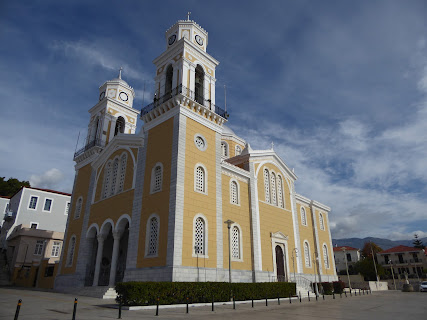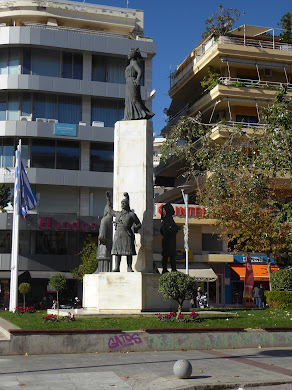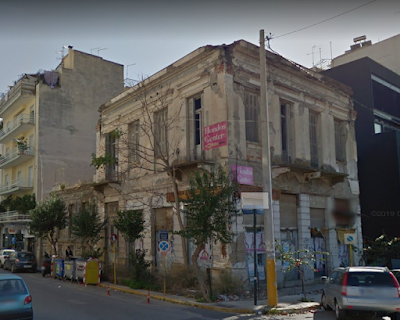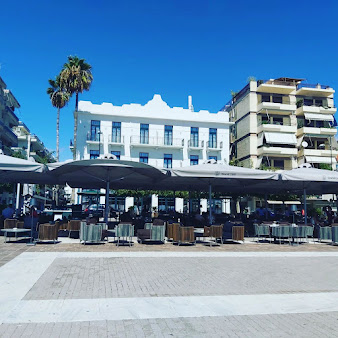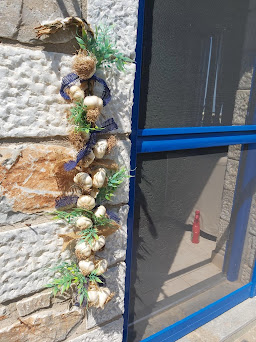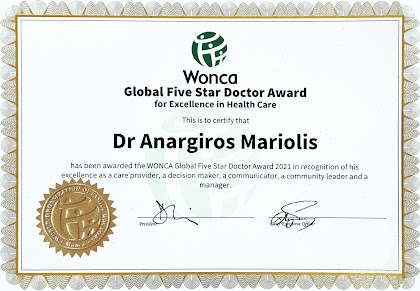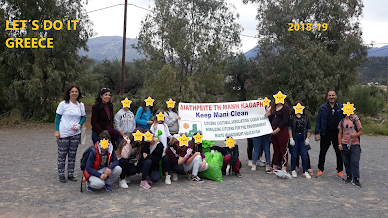'Summertime and the livin' is easy', that wonderful song from the musical Porgy and Bess could be the theme song for our summers in Greece.
 |
| The livin' is easy. . . |
It is quite literally a time when the pace slows and the livin' is easy; a time when we simply savor summer. You might say, we simply enjoy just 'being'. The month of August is when Greeks take their vacations - often to coincide with the holiday, the Dormition of the Virgin Mary' on Aug. 15th. So many businesses and services - that don't cater to tourists - are closed. It is expected that little work or business will get done, making it a perfect time for slowing down and savoring life.
 |
| Warm breezes and cicadas' song combine |
Summer is a time when the warm afternoon and evening breezes carries the sound of children's laughter, simply echoes of happiness, from the beach below us. It is a time when the ceiling fan and cicadas' song create an irresistible lullaby that lulls us into afternoon naps lasting from a few minutes to a few hours.
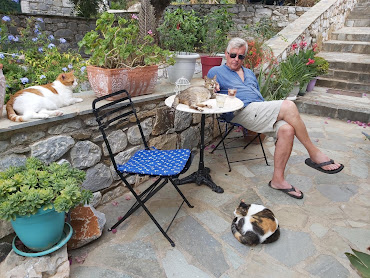 |
| Three of our four cats relax in the summer breeze |
It is a time our collection of adopted cats, now numbering four felines, retire to their chosen spots in the shade where they stretch out and snooze until the cool of the evening brings them back to life.
 |
| Summer's Aperol Spritz time |
We are simply savoring our summer by reading books that have beckoned from the bedside table for months, wiling away hours with friends sipping wine, summer drinks, or cappuccinos. Sometimes we simply watch cloud formations pass overhead or listen to the waves breaking against the seashore.
I love that word, 'savor', as means to experience something slowly in order to enjoy it as much as possible. The art of savoring time and experiences is something we've learned to appreciate since becoming expats in Greece. Here we find we have the time to savor life all year round, but especially on these long, languid days of summer.
 |
| Savoring the moments of summer |
La Dolce Far Niente
Another favorite phrase that aptly describes summer life in this rural slice of the Greece Peloponnese is, 'La Dolce Far Niente' which loosely translated from Italian it means the sweetness of doing nothing.
 |
| Watching clouds and seafoam - a favorite pastime |
I hadn't given much thought to the benefits, beyond enjoyment, of the sweetness of doing nothing and savoring our Mediterranean moments, until I read an article by Dr. Nicole Marcione* about the health benefits - mental and physical - of that laid-back lifestyle. She points out that savoring life and la dolce far niente go hand-in-hand.
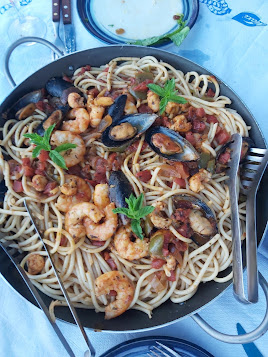 |
| Fresh seafood pasta |
It isn't so much that you are doing nothing, but that you are slowing down and savoring what you are doing: the food you eat; the people with whom you spend time; the activities you choose to pursue; the approach you take to living.
 |
| Calamari salad |
She writes in an article 'Indulging in the Science and Sensuality of Longevity' for The Mediterranean Lifestyle magazine, that as we slow down, so does our physiology:
'Our blood pressure goes down, our heart rate settles, our stress hormones (i.e., cortisol and adrenaline) decrease and our pleasure hormones increase (i.e., dopamine and serotonin). We trigger our parasympathetic nervous system (rest/digest/heal) to kick in, while turning down our sympathetic nervous system (fight/flight/freeze). This, in turn, activates our physical and emotional bodies to repair and restore. The more we create this slowing down and enjoyment in our life, the longer, and (more importantly) the healthier we live.'
 |
| Stone House on the Hill from my garden |
She points to all the aspects of savoring a Mediterranean lifestyle -- not just a diet -- as a healthier way of living; right down to the olive oil we slather on all food (healthy eating), the walk we take to get to the village or the time we spend working in the garden (exercise), the time spent with friends (community connection) to slowing to enjoy the beauty that surrounds us (rejuvenating the spirit).
So savoring life isn't only enjoyable - it is healthy! Can't beat that combination to our way of thinking.
 |
| A Summer's Night in the Village |
Summer's End
I am feeling nostalgic about these Greek summer days as by the time many of you read this, our Greek summer will have come to an end. We are returning to the U.S. Pacific Northwest, our other world, and will experience a bit of summer there.
As I've packed suitcases, I am reminded of the time we used to do the 'Schengen Shuffle' as I call it. Back when we traveled between the US and Greece at 90-day intervals, before we were residents of Greece. It seemed back then that we were always leaving too soon, I wasn't ready for our time here to end.
 |
| Watching sunsets and clouds - a soothing end to the day |
Again, I have that twinge of it ending too soon. By the time we return it will be autumn, which is also a lovely time here. The pace will have picked up a bit as we move into the season of olive harvest and preparing for winter, which will be here before we know it.
 |
| Washington State known for its wine and vineyards |
It has been nearly a year since we spent time in our 'other world' and our 'to do and to see' list for that world is a long one - we may not have a lot of time for watching clouds or napping once we touch down. As I've written before the catalyst taking us back this time is my high school reunion. It's a big one and it has been a half century in the making, plus one year - thanks to Covid.
This will be our first taste of summer in Central Washington since 2017, the year we made Greece our home base. We have made our recent trips back to Washington in the spring or fall.
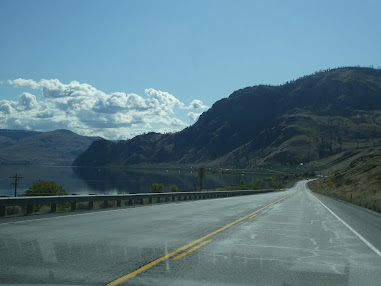 |
| Soon we'll be on Memory Lane, the road home |
While our 'other world' home is in Manson, in the central part of Washington State, it is a few hours' drive away from my hometown, Yakima. So, it will definitely be a trip down Memory Lane for me and a return to my hometown for the first time in five years. As our departure time approaches, I've been pondering the question, 'Can you go home again?' and that, my friends, may just be the topic of my next post. I'd welcome any thoughts you have about it!
Hope you will be with us then and thanks to the time you've spent with us today! Hope whatever season you are experiencing where you are, that you will have time to savor it and indulge in a bit of 'la dolce far niente'!
*For those of you who'd like to read more by Dr. Marcione you can find her on Instagram @drnicolemarcione and her website is www.integrativeaging.com
Linking sometime with:
Through My Lens
'






